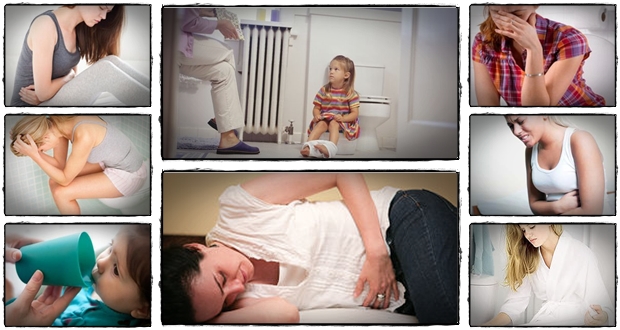List
of Diseases > Constipation
Overview - Constipation 
One of the commonest gastro-intestinal complaints, constipation affects almost 2% of the population on a chronic basis globally. A large number of people wrongly believe themselves to be suffering from constipation if they do not get a bowel movement everyday. The medical understanding of the disorder 'constipation' is, however, slightly different from this. Having less than three bowel movements a week is termed as constipation. In addition, having hard stools or requiring to strain at stools for a long time also constitutes constipation.
An outcome of errant eating habits and sedentary lifestyle in most cases, constipation is a very common complaint and tends to be under-diagnosed since most patients usually prefer to try a lot of home remedies rather than reporting for treatment. The belief that constipation leads to accumulation of toxins in blood also results in significant abuse of laxatives and purgatives by patients.
Homeopaths have treated constipation with good results
for many years now and the response to treatment is very
promising in Homeopathy. The goodness of homeopathy also
lies in the fact that the medicines are safe and non habit-forming
unlike conventional laxatives which create a dependence
in patients. We have treated a large number of cases of
habitual constipation and have helped many patients to get
rid of their dependence on purgatives and laxatives. We
firmly believe that timely Homeopathy treatment can provide
the best solution to chronic constipation and solve this
problem from the roots.
What is Constipation?
 Constipation
- one of the commonest gastrointestinal problems is a cause
of distress for a large number of people globally. Constipation
can affect people of all ages though it tends to be common
amongst children and the elderly people (above 65 years
of age) Constipation
- one of the commonest gastrointestinal problems is a cause
of distress for a large number of people globally. Constipation
can affect people of all ages though it tends to be common
amongst children and the elderly people (above 65 years
of age)
A common misbelief that exists amongst people is that if they do not get a bowel movement every day, they are constipated. However, there is nothing like a fixed frequency to judge the normalcy of bowel movements. Three bowel movements a day to three in a week is considered normal and this varies from person to person. So if a person defecates less than 3 times a week, he can be said to be constipated.
Again the consistency of the stools and the amount of straining
required for defecation also requires to be considered.
Hard, dry stools that are difficult to be passed or that
require a lot of straining constitute constipation.
Some other features that arise on account of constipation are:
- Bloated feeling in the abdomen
- Sluggishness in general
- Unsatisfied feeling after passing stools, feeling of incomplete evacuation
- Rectal fullness needing manual evacuation of stools
Constipation tends to be much more common amongst females as compared to males, the male: female ratio being 1:3. Constipation is very common during pregnancy and after childbirth. Almost 40% of people above the age of 65 years experience chronic constipation.
An occasional bout of constipation is extremely common but if the complaint tends to be very frequent, medical assistance must be sought. Again, if someone experiences sudden and very acute constipation, immediate treatment must be sought to rule out a serious medical illness (bowel obstruction due to a tumor, etc.)
Some symptoms that you must watch out for; report to the doctor at the earliest if you notice any of these:
- Rectal bleeding
- Severe abdominal pain
- Nausea and vomiting
- Fever
- Loss of weight
A large number of people with chronic constipation use over-the-counter laxatives and millions of dollars are spent annually to treat this condition. The problem with laxatives is that they provide only temporary relief and tend to be habit forming many times. Homeopathy can provide effective treatment for constipation, one that is safe yet non habit-forming.
Causes of Constipation
Constipation, in most cases, is an outcome of faulty eating habits and lack of exercise. Normally, as the food gets digested, it passes from stomach through the small intestine into the large intestine. Most of the water from the remaining undigested food gets reabsorbed in the large intestine. If the large intestine (colon) absorbs too much of water due to slow movement of the undigested food, the stools that are formed become dry and hard. Additionally, if the movement is slow enough to cause an urge for stool less than thrice a week, it results in constipation.
Some of the common triggers of constipation include:
- Poor intake of fluids - drinking less of water and other fluids
- Less fiber in diet
- Sedentary lifestyle - not much of activity
- No exercise
- Ignoring the urge for stools when there is one
- Change in routine, travelling
- Pregnancy and childbirth
- Abuse of laxatives - Laxatives lead to dependence in the long term because the colon begins to rely on the laxatives for a normal bowel movement
- Medications like certain painkillers, iron supplements, diuretics, antidepressants, etc.
- Pain in the anal region due to fissure or piles (hemorrhoids) can lead to suppression of the urge for stools later leading to constipation.
- Hormonal problems like hypothyroidism
- After an abdominal surgery
In case of constipation in children, the following must be considered:
- Switching from breast milk to bottle milk or solid meals
- Toilet training anxiety
- Ignoring an urge for bowel movement
- Hirschsprung's disease (rare condition where the child has a nerve cell defect from birth that affects communication between the brain and bowels)
Some rarer causes of constipation include:
- Tumor of the bowels
- Lead poisoning
- Lactose intolerance
- Spinal cord injury that has damaged nerves reaching the intestines
Diagnosis of Constipation
Diagnosis of constipation is largely done on the basis of the symptoms given by the patients. The main criteria for diagnosing constipation are that any 2 of the following must be present for a period of 12 weeks or more (whether continuous or not) in the last 12 months:
- Less than three bowel movements per week
- Stool that is hard and difficult to pass
- Straining hard at stools
- Sensation of incomplete evacuation
- Sensation of blockage in the anus or rectum
Constipation that is diagnosed on the basis of above symptoms needs further evaluation as to the cause and for the same, the physician may order certain investigations:
- Barium enema X-ray: X rays are taken after the inner lining of the bowel gets coated with a contrast dye.
- Sigmoidoscopy: In this test, the lower part of the large intestine (called sigmoid colon) is examined by passing a thin, flexible tube through the anus. The tube has a tiny camera at one end and this is used to visualize the inside of the colon.
- Colonoscopy: In this test, the entire large intestine (colon) is examined by passing a thin, flexible tube through the anus. The tube has a tiny camera at one end and this is used to visualize the inside of the colon.
- Serum electrolytes: To check for electrolyte imbalance
- Thyroid profile: To check for Hypothyroidism
Some other tests that may be done (though not very often) include:
- Defecography: A test done to evaluate how well the rectal muscles contract and eliminate the stool.
- Anorectal manometry: This test determines the efficiency of the co-ordination of muscles used to defecate.
- Colorectal transit study: This test examines how food passes through the colon and looks for signs of intestinal muscle dysfunction.
Complications
Constipation is not a very serious condition in most cases. However, cases that have a sudden, acute onset and are severe in intensity must be closely watched. Long-standing cases of constipation may develop certain complications over a period of time due to repeated straining:
- Prolapse of rectum
- Fissure-in-ano (cracks in the anus due to passage of hard stools)
- Hemorrhoids (Piles)
- Impaction of stools in the rectum (requires stool to be removed manually)
Homeopathy treatment
Homeopathy has very good scope in the treatment of constipation. Homeopathy practitioners have repeatedly demonstrated that people who were prescribed constitutional remedies experienced significant relief from their constipation and overall improvement in their general health as well.
Homeopathic remedies gently bring the functionality of the bowels back to normal. This helps in regularization of bowel movements as well in the formation of stools of normal consistency. After starting Homeopathy treatment, most patients can reduce their dependence on laxatives, purgatives, cathartics, etc. successfully.
Homoeopathy, being a holistic healing science, takes into consideration not only the physical symptoms of the case but also the psychological aspects while prescribing for the patient. Thus, the patient’s habits, nature, behavior, etc. are all taken into account while prescribing. This helps to treat the problem from the roots rather than simply treating it symptomatically.
During Homeopathy treatment, the cause of the constipation is also taken into account for arriving at the correct remedy. For example, a remedy called Nux Vomica can be given to Type A personalities having an ineffectual urge to pass stools due to irregular food and sleeping habits; indulgence in substance abuse (like tobacco) or alcoholism. Patients with no urge to pass stools at all would probably need the homeopathic remedy Opium. Platina would be a good remedy for extremely conscious and high-profile women who control the urge to pass stools when travelling because they don’t like to use public toilets. Alumina is very useful for patients who developed constipation because of eating food cooked in aluminum vessels for years together. Senna is a time tested remedy for obstinate constipation, especially in children.
A large number of people suffering from chronic constipation have been treated at Dr. Khullar with good results. The best part about homeopathic medicines is that they are non habit-forming. The importance of a proper, balanced diet and regular exercise cannot be over-emphasized when it comes to managing constipation. It is suggested that people suffering from constipation must opt for Homeopathy treatment at the earliest.
Self-care tips
Based on our experience of treating a large number of cases
of chronic constipation successfully with homeopathy, we
have observed that following certain diet and regimen tips
goes a long way in management of this condition. We have
repeatedly verified these clinical tips and found them to
be useful in most cases:
- Include plenty of vegetables, salads and fruits in your diet
- Chew your food properly; do not swallow food in a hurry
- Drink at least 6-8 glasses of water daily
- Eat only when hungry
- Avoid overeating and eating between meals
- Replacing polished rice with unpolished rice and white bread with brown bread is very useful for those suffering from habitual constipation
- Regular exercise helps in maintaining good bowel health
- Avoid over-the-counter laxatives because long-term intake of these may damage the lining of the bowels and injure nerve endings in the colon
- Preferably go to the toilet at the same time every day to ensure regular bowel movements
- A glass of warm milk before sleeping helps in relieving constipation
|